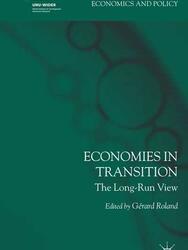Book
Economies in Transition
The Long-Run View
The twentieth anniversary of the fall of the Berlin Wall has stimulated much reflection on the political, economic and social transitions that have taken place in the past two decades. Many Central European and Baltic countries initially appeared to epitomize a successful transition to markets and democracy, becoming full members of the European Union.
Yet the impact of the recent global financial crisis has called into question the stability of their success, and the viability of existing political arrangements.
This book focuses on the long-term development of the former Soviet bloc, providing a stimulating discussion on a range of important issues, including institutional development, demographic trends and the role of civil society. Twenty-three eminent scholars discuss the effects and implications of reform policies, providing a unique perspective on the past as well as the economic prospects for the future.
 Join the network
Join the network